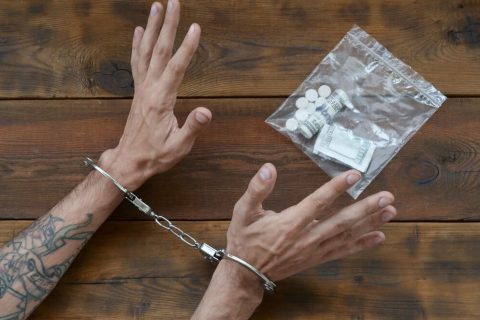How Does Heroin Affect the Body?

Despite its illegal status, heroin use remains a significant problem in many parts of the world, impacting the lives of addicts and their families.
But how does heroin affect the body?
Join us as we delve into the science behind heroin abuse and uncover what makes it so devastating for users and their loved ones!
What is Heroin?
Heroin is a highly addictive drug affecting the lives of millions of people worldwide.
It is derived from a naturally occurring substance, morphine, extracted from the seed pod of certain varieties of poppy plants.
Heroin is usually found as a white or brown powder or a black sticky substance known as “black tar” heroin.
The drug can be injected, smoked, or snorted.
Now that we know what heroin is, let’s answer the question, “How does heroin affect the body?”
How Does Heroin Affect the Brain and Body?
Let’s delve deeper into the grave influences heroin use has on our brains and bodies.
How Heroin Affects the Brain
One reason for heroin’s high addiction potential is how it affects the brain.
When heroin enters the brain, it quickly converts into morphine and binds to opioid receptors throughout the body.
These receptors are in pain perception, pleasure, reward, and breathing areas.
Once these receptors are activated by heroin, they trigger the release of dopamine – a neurotransmitter that plays a crucial role in regulating mood, motivation, and pleasure.
This dopamine release produces an intense euphoria that users describe as a “rush.”
However, repeated use over time makes these receptors desensitize to heroin’s effects and require higher doses to achieve the same high.
What Does Heroin Do to the Body?
Heroin abuse has short-term and long-term effects on the body.
Short-Term Effects
Heroin abuse can lead to several short-term impacts on the body, such as:
- Dry mouth
- Flushed skin
- Nausea and vomiting
- Severe itching
- Clouded mental function
- Slowed breathing
- Reduced heart rate
These symptoms can last for several hours after taking heroin.
Long-Term Effects on the Body
Long-term heroin abuse can cause severe damage to various organs in the body, such as:
- Liver Damage: The liver filters toxins from our bloodstream. With prolonged heroin use, it becomes overloaded with toxins leading to liver damage.
- Kidney Damage: Heroin abuse causes dehydration which puts extra stress on the kidneys leading to kidney damage.
- Heart Problems: Heroin use slows down the heart rate and reduces blood pressure levels which increases the chances of a heart attack.
- Lung Problems: Smoking or inhaling heroin can cause lung problems such as pneumonia or tuberculosis.
- Infectious Diseases: Sharing needles while injecting drugs increases the risk of contracting contagious diseases such as HIV or AIDS and hepatitis B and C.
Why Is Heroin Abuse Prevalent?
There are various reasons heroin abuse is prevalent among individuals:
Availability
Unlike prescription opioids that require prescriptions from doctors, heroin is readily available through illegal means such as street dealers.
Low-Cost
Heroin costs significantly less than prescription opioids making it more accessible for individuals who cannot afford expensive medications prescribed by doctors.
Emotional Trauma
Individuals suffering from emotional trauma often turn to drugs like heroin as a coping mechanism to deal with their emotions.
Peer Pressure
Peer pressure also plays a significant role in drug abuse. Individuals who hang out with others who use drugs are likely to try them themselves.
What Treatment Options are Available for Heroin Abuse?
Fortunately, there are treatment options available for individuals struggling with drug addiction:
Medication-Assisted Treatment (MAT)
MAT involves using medication like methadone or buprenorphine, which helps reduce cravings and withdrawal symptoms associated with quitting heroin, along with behavioral therapy sessions.
Inpatient Rehab Centers
Inpatient rehab centers provide 24/7 medical care and counseling sessions to help individuals overcome their addiction away from any triggers present at home.
Outpatient Rehab Treatment
Outpatient rehab programs offer similar services to counseling sessions but allow individuals to stay home while receiving treatment.
What Should You Do in the Case of an Overdose?
With an overdose, it is crucial to recognize the signs and take action as soon as possible.
Signs of an overdose include:
- Slow or stopped breathing
- Blue lips or fingernails
- Loss of consciousness
- Slow heart rate
- Dizziness
If you suspect a heroin overdose is occurring, call 911 immediately and stay with them until help arrives.
Keep the Naloxone (Narcan) medication nearby, which is used to reverse an opioid overdose.
Atlantic Recovery Center Treats Heroin Addiction in South Florida
Heroin addiction has devastating effects on both the mind and body. It’s essential for individuals struggling with drug addiction to seek professional help before it’s too late.
Atlantic Recovery Center is an residential addiction rehab center in South Florida. We offer state-of-the-art treatments for heroin addiction in a safe and supportive environment.
Our knowledgeable staff will help you get through the most challenging times of withdrawal and provide the resources needed to stay sober.
We use a mixed approach combining behavioral therapy, individual counseling sessions, group sessions, and 12 step programs to ensure a successful recovery. Contact ARC today to learn more about our Heroin treatment program!





